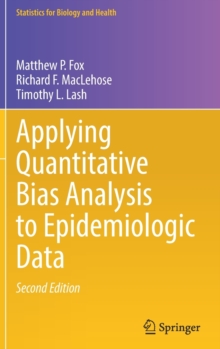Description
| Product ID: | 9783030826727 |
| Product Form: | Hardback |
| Country of Manufacture: | GB |
| Series: | Statistics for Biology and Health |
| Title: | Applying Quantitative Bias Analysis to Epidemiologic Data |
| Authors: | Author: Matthew P. Fox, Timothy L. Lash, Richard F. MacLehose |
| Page Count: | 467 |
| Subjects: | Medical equipment and techniques, Medical equipment & techniques, Public health and preventive medicine, Epidemiology and Medical statistics, Probability and statistics, Biology, life sciences, Biotechnology, Information technology: general topics, Computer science, Public health & preventive medicine, Epidemiology & medical statistics, Probability & statistics, Biology, life sciences, Biotechnology, Information technology: general issues, Computer science |
| Description: | Select Guide Rating This textbook and guide focuses on methodologies for bias analysis in epidemiology and public health, not only providing updates to the first edition but also further developing methods and adding new advanced methods. As computational power available to analysts has improved and epidemiologic problems have become more advanced, missing data, Bayes, and empirical methods have become more commonly used. This new edition features updated examples throughout and adds coverage addressing:Measurement error pertaining to continuous and polytomous variablesMethods surrounding person-time (rate) dataBias analysis using missing data, empirical (likelihood), and Bayes methods A unique feature of this revision is its section on best practices for implementing, presenting, and interpreting bias analyses. Pedagogically, the text guides students and professionals through the planning stages of bias analysis, including the design of validation studies and the collection of validity data from other sources. Three chapters present methods for corrections to address selection bias, uncontrolled confounding, and measurement errors, and subsequent sections extend these methods to probabilistic bias analysis, missing data methods, likelihood-based approaches, Bayesian methods, and best practices. This textbook and guide focuses on methodologies for bias analysis in epidemiology and public health, not only providing updates to the first edition but also further developing methods and adding new advanced methods. As computational power available to analysts has improved and epidemiologic problems have become more advanced, missing data, Bayes, and empirical methods have become more commonly used. This new edition features updated examples throughout and adds coverage addressing:
A unique feature of this revision is its section on best practices for implementing, presenting, and interpreting bias analyses. Pedagogically, the text guides students and professionals through the planning stages of bias analysis, including the design of validation studies and the collection of validity data from other sources. Three chapters present methods for corrections to address selection bias, uncontrolled confounding, and measurement errors, and subsequent sections extend these methods to probabilistic bias analysis, missing data methods, likelihood-based approaches, Bayesian methods, and best practices. |
| Imprint Name: | Springer Nature Switzerland AG |
| Publisher Name: | Springer Nature Switzerland AG |
| Country of Publication: | GB |
| Publishing Date: | 2022-03-25 |


